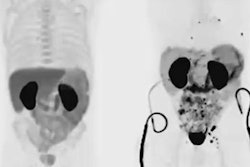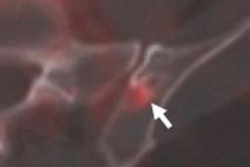
Prostate-specific membrane antigen (PSMA)-PET/CT imaging with the radiotracer F-18 DCFPyL (Pylarify, Lantheus Medical Imaging) changed treatment plans for nearly 50% of prostate cancer patients experiencing recurrence following a radical prostatectomy, according to a study in the September issue of the Journal of Nuclear Medicine.
This study included 100 patients. Radiation oncologists outlined each patient's "original intent" treatment plan on a questionnaire, and all patients then underwent CT and F-18 DCFPyL PSMA- PET/CT.
CT results were released first, and a second "post-CT intent" questionnaire was completed. Next, F-18 DCFPyL PSMA-PET/CT results were released, and a final "post-PSMA intent" questionnaire was completed. Change in management was graded based on impact and defined as major, minor, or no change demonstrated.
According to the results, F-18 DCFPyL PSMA-PET/CT detected disease in 46.9% of patients compared with 15.5% on diagnostic CT. Major changes in the treatment plan were more likely to occur after PSMA imaging (12.5%) than after CT imaging (3.2%), and moderate changes were noted in 31.3% of patients after PSMA imaging versus 13.7% after CT imaging.
The most common changes in patient management were recommendations for additional treatment, such as elective pelvic radiation, nodal boost, or concurrent androgen deprivation therapy, according to the authors.
"The study's results are timely and applicable for patients experiencing their first recurrence after prostate surgery," noted study author Dr. Michael Ng, a radiation oncologist at GenesisCare St Vincent's Hospital in Melbourne, Australia.




















